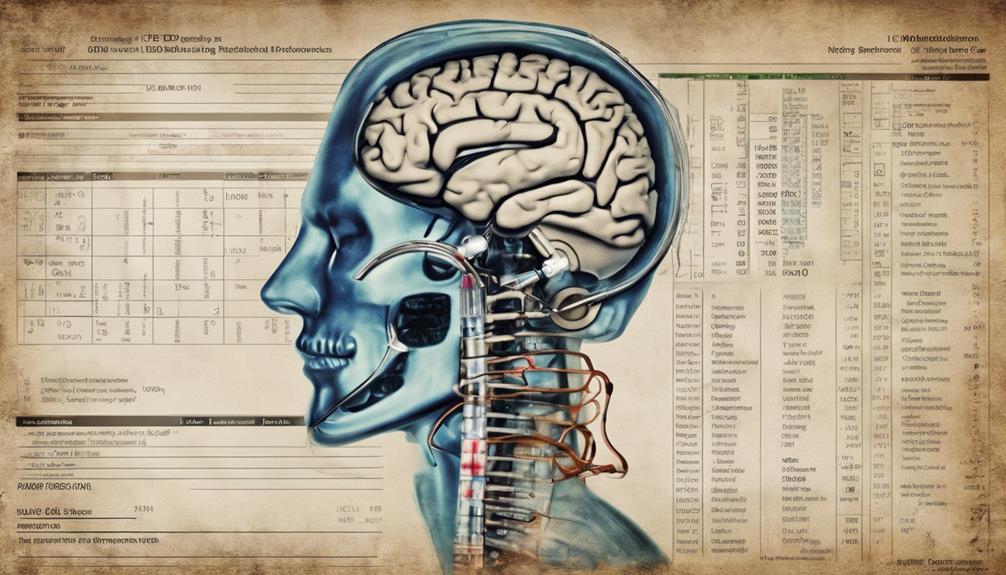When considering the intricate relationship between dementia and seizures, it is important to recognize the profound impact these conditions can have on individuals, particularly among the elderly demographic.
Take, for instance, the heightened occurrence of seizures in patients with Alzheimer's disease. Understanding the complexities of managing seizures in the context of dementia presents a unique challenge, prompting us to explore tailored treatment approaches and follow-up care diligently.
The interplay between dementia and seizures unveils a multifaceted landscape that necessitates further exploration to enhance patient outcomes and quality of life.
The Relationship Between Dementia and Seizures
In individuals diagnosed with dementia, an intricate and bidirectional relationship exists between the condition and the occurrence of seizures. Seizures in Alzheimer's disease can manifest as either generalized or focal, with the latter being more prevalent. The cognitive decline seen in dementia can predispose individuals to seizures due to neuronal loss and abnormal brain activity. Temporal lobe epilepsy, a common form of focal epilepsy, is often associated with memory function, highlighting the interplay between epilepsy and cognitive impairment in dementia patients.
The incidence of seizures in dementia is significantly high, with recurrent seizures meeting the criteria for epilepsy diagnosis. Symptomatic causes, such as structural brain changes and neurodegeneration, contribute to the increased risk of seizures in individuals living with dementia. Moreover, the association between epilepsy and dementia is noteworthy, as having one condition doubles the risk of developing the other. Understanding this complex relationship is crucial for providing comprehensive care to individuals facing the challenges of both dementia and seizures.
Risk Factors for Seizures in Dementia

Severe cerebral atrophy in individuals with dementia significantly heightens the risk of developing seizures. Several risk factors contribute to the increased susceptibility to seizures in dementia patients, including:
- Alzheimer's Disease: Individuals with Alzheimer's disease have a 6- to 10-fold increased risk of experiencing clinical seizures.
- Recurrent Seizures: The risk of recurrent seizures after the first episode in elderly individuals with dementia can be as high as 80 percent.
- Duration of Disease: Seizure prevalence in Alzheimer's disease patients increases with the duration of the disease, especially in cases of early-onset familial Alzheimer's disease.
- Hippocampal Sclerosis: The presence of hippocampal sclerosis is associated with a higher risk of developing focal seizures in patients with dementia.
Understanding these risk factors is crucial for healthcare providers managing seizures in dementia patients, as they can help anticipate and address potential seizure-related complications effectively. By identifying and mitigating these risks, healthcare professionals can improve the quality of life for individuals living with dementia and seizures.
Managing Seizures in Dementia Patients
Optimizing treatment strategies for managing seizures in dementia patients involves initiating appropriate therapy promptly after the first seizure with focal neurological involvement.
Selecting antiepileptic drugs with minimal cognitive adverse effects is crucial when treating seizures in elderly patients with dementia.
It's essential to monitor drug levels regularly to ensure the effectiveness of treatment.
Lifestyle modifications, such as maintaining proper sleep hygiene and managing stress, can play a significant role in reducing seizure frequency in individuals with dementia.
Caregivers should be educated on providing first aid during a seizure and recognizing when to seek emergency medical assistance.
By involving caregivers in the management process, the overall care for dementia patients experiencing seizures can be enhanced.
Ensuring a comprehensive approach that considers medication management, lifestyle adjustments, and caregiver education is vital in effectively managing seizures in this vulnerable population.
Impact of Seizures on Dementia Progression

Exploring the impact of seizures on the progression of dementia reveals a complex interplay between cognitive decline and neurological manifestations. Seizures in dementia patients can have detrimental effects on various aspects of their well-being, exacerbating the challenges associated with managing the condition.
Here are some key points to consider:
- Cognitive Function: Seizures can worsen cognitive function, leading to accelerated decline in memory, reasoning, and decision-making abilities.
- Injury Risk: The increased risk of injury during seizure episodes can further compromise the physical health of individuals with dementia, affecting their overall quality of life.
- Emotional Distress: Seizures often result in emotional and psychological distress, impacting not only the patients but also their caregivers, who may experience heightened levels of stress and anxiety.
- Behavior Changes: Seizures may cause significant behavior changes, including agitation, aggression, or withdrawal, making it challenging to provide adequate care and support.
Effectively managing seizures in dementia patients is crucial to mitigating their adverse effects on cognitive function, emotional well-being, and overall progression of the disease.
Strategies for Seizure Prevention in Dementia
To enhance the overall management of seizures in individuals with dementia, implementing effective strategies for seizure prevention is paramount in improving their quality of life and cognitive well-being. Strategies for seizure prevention in dementia encompass a multifaceted approach that includes lifestyle modifications, trigger avoidance, caregiver education, and regular follow-up appointments with healthcare providers. Adhering to prescribed antiepileptic medications and monitoring drug levels are crucial elements in reducing the risk of seizures in dementia patients. Educating caregivers on recognizing early signs of seizures, providing appropriate first aid during a seizure, and knowing when to seek medical help are essential components of seizure prevention in dementia. Regular follow-up appointments with healthcare providers allow for the assessment of the effectiveness of seizure prevention strategies and enable necessary adjustments to be made. By incorporating these comprehensive strategies, individuals with dementia can experience a significant reduction in the occurrence of seizures, leading to improved overall well-being and enhanced quality of life.
| Strategies for Seizure Prevention in Dementia | Description |
|---|---|
| Lifestyle Modifications | Maintain regular sleep patterns and manage stress to help prevent seizures. |
| Trigger Avoidance | Avoid factors like excessive alcohol consumption that may provoke seizures. |
| Caregiver Education | Educate caregivers on recognizing early signs of seizures and providing first aid. |
| Follow-up Appointments | Regular healthcare provider visits to assess the effectiveness of prevention strategies. |
Frequently Asked Questions
Is It Normal to Have Seizures With Dementia?
Yes, seizures can occur in individuals with dementia, although they aren't considered a typical feature of the condition. The risk of seizures in dementia varies based on the specific type of dementia.
Medications like Keppra and Depakote are often used to manage seizures in individuals with dementia. It's crucial to adopt a comprehensive approach, including medication adjustments, monitoring, lifestyle changes, and caregiver education, to effectively manage seizures in this population.
How Do You Treat Seizures in Dementia Patients?
When treating seizures in dementia patients, it's crucial to start with antiepileptic drugs (AEDs) like Keppra and Depakote. Initiate treatment after the first seizure with focal neurological involvement and choose AEDs with minimal cognitive adverse effects.
Monitoring drug levels is essential for optimal seizure control and to minimize side effects. Adjusting medication dosages carefully may be necessary to effectively manage seizures in dementia patients.
Are Seizures Common in End Stage Dementia?
Yes, seizures are common in end-stage dementia. The prevalence can range from 4% to 23%, with an increased risk as dementia progresses.
Managing seizures in late-stage dementia poses challenges and requires specialized treatment. Close monitoring is crucial, as seizures can impact the quality of life for patients and caregivers.
Special attention is needed to address the unique needs of individuals with end-stage dementia experiencing seizures.
What Is the Best Seizure Medication in Dementia?
When considering the best seizure medication, it's crucial to assess the individual's specific needs and medical history. Factors like drug interactions, side effects, and overall tolerability play a significant role in determining the most suitable treatment.
Consulting with healthcare professionals can provide valuable insights and guidance on selecting the most appropriate medication for managing seizures effectively. It's essential to prioritize safety, efficacy, and the overall well-being of the individual when making such decisions.
How Can Managing Dementia-Related Seizures Impact Alzheimer Patients’ Care?
Managing dementia-related seizures can significantly impact Alzheimer patients’ care. It is crucial to find expert Alzheimer doctors near the patient for timely intervention and proper medication management. Understanding the relationship between seizures and dementia is essential in providing comprehensive care and improving the patient’s quality of life.
Conclusion
In conclusion, the intricate relationship between dementia and seizures poses significant challenges for healthcare providers and patients alike.
It's noteworthy that up to 22% of individuals with dementia experience seizures, underscoring the importance of proactive seizure management strategies.
By understanding the risk factors, implementing tailored treatment plans, and focusing on prevention measures, healthcare professionals can effectively address the impact of seizures on dementia progression and enhance the quality of life for patients.








